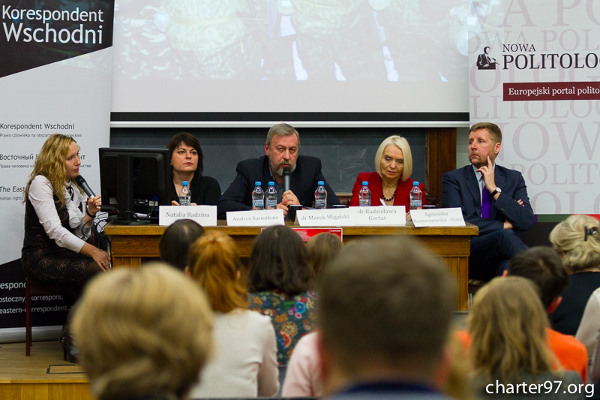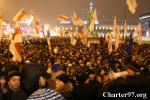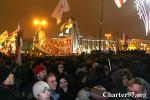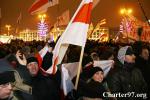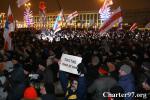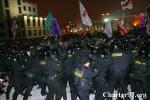Belarusians will rebel anyway
158- 19.12.2013, 15:01
- 134,180
Today is the third anniversary of the post-election protests in Belarus.
The presidential election was held in Belarus on December 19, 2010. After polling stations closed, tens of thousands of Belarusians gathered for a rally against the rigged results of the presidential elections. It was the biggest protest rally in Belarus for the last few years. Peaceful protests were brutally suppressed by the police and troops.
Arrests and interrogations of activists lasted for several months. More than 700 people were thrown behind bars, scores of beaten people were taken to hospitals. Criminal cases were opened against 46 leaders and activists of the opposition, including presidential candidates. Many of them received prison terms of from two to six years. Thousands of Belarusians had to flee the country fearing criminal prosecution.
The conference “Does Europe Remember Belarus?” in the University of Warsaw was focused on the events in Minsk on December 19, 2010. Andrei Sannikov, a candidate in the 2010 presidential elections and the leader of the civil campaign European Belarus, editor-in-chief of charter97.org Natallia Radzina, member of the European Parliament and deputy head of the Delegation for Relations with Belarus Marek Migalski took part in the conference. The event aroused keen interest of students – the room was full of Poles, Belarusians and Ukrainians.
The conference was held during the ongoing protests in Ukraine. Participants of the conference drew parallels between the events in Kyiv and Minsk.
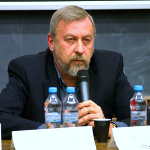 Former presidential candidate Andrei Sannikov said the post-election protests in Minsk had a great impact both on Moscow protests in 2011-2012 and the events in Kyiv today.
Former presidential candidate Andrei Sannikov said the post-election protests in Minsk had a great impact both on Moscow protests in 2011-2012 and the events in Kyiv today.
“Many compare the 2010 protests and the Euromaidan rally. Objective questions appear. Why can people in Kyiv remain on the square for almost a month? Why was it impossible in Minsk? What should be done to have long protests in Belarus? I am sure these are links of the same chain. If it hadn't been for the 2010 protests and all previous rallies in Belarus, the Ukrainian pro-EU protests wouldn't have started. Our country has been protesting against the dictator since 1995. Most activists went through jails. Opposition leaders were killed in 1999, the most tragic year for our country. Protests have been continuing,” he said.
Andrei Sannikov emphasised: Belarusian democrats hoped for Europe's support, but they didn't always receive it. The West helped Lukashenka instead. The EU makes the same mistake with Ukraine today.
“Comparing the Euromaidan rally and the 2010 protests, I dream that Europe will take an active part in protecting people, in supporting their right for new authorities, in our countries' movement to Europe. It didn't happen in 2010. The aid, also economic aid, was for the Lukashenka regime. At the same time, the West didn't expect people in Belarus to be so active. Europe was ready to continue dealing with Lukashenka.
Ukraine has met the same attitude. It's naïve, to say the least, to hope that a country can become closer to European standards through a dialogue with a dictator or an autocrat,” Sannikov is convinced.
The leader of the European Belarus campaign noted a new principled European strategy was needed for Belarus and the whole region.
“Some people say the 2010 presidential campaign was liberal. It wasn't liberal for me. Just after I had announced my decision to run for presidency, members of my team and I faced searches, my family received threats, key member of my team Aleh Biabenin was killed some days before the start of the campaign.
Belarus is in the most difficult situation it has ever met. Repressions in Belarus are getting stronger while Brussels is saying about hopes for a dialogue and counting that Lukashenka will suddenly stop being a dictator. Opposition and civil society are deprived of opportunities to carry out legal or even half-legal activity. But Belarusians continue to struggle. Is the European Union ready to do for Belarus what the civilised world did for Poland?” the politician asked.
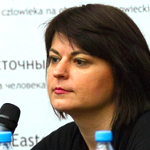 Natallia Radzina, the editor-in-chief of charter97.org, recalled some moments of Polish history and compared them with the events in today's Belarus.
Natallia Radzina, the editor-in-chief of charter97.org, recalled some moments of Polish history and compared them with the events in today's Belarus.
“Poland recently marked an anniversary of the introduction of martial law. All of you are young people. You don't know much about it, but your parents remember it well. Belarus has been living in a state of emergency for the third year. Our country has been remaining the last dictatorship of Europe for 20 years. But the dictatorship become much tougher on 19 December 2010. This date changed our life. None of us wanted to leave Belarus. We wanted to stay in the country and win. Yes, we went through prisons, it was difficult to work, but we have possibilities to work. Today, legal opposition activity in the country is scarcely possible.
It wasn't just a dispersal of a large protest rally against the fraudulent elections on 19 December 2010. The greatest part of the country's political elite was imprisoned. Opposition leaders and activists received long prison terms. As a journalist, I could have faced up to 15 years in prison. A state of emergency was in fact declared. It hasn't been lifted,” Natallia Radzina said.
The editor of charter97.org noted the situation could change at any moment, though the opposition had to go underground and the independent media had been closed or suffered from censorship.
“The economic state of Belarus is very difficult. Law-enforcement services and security agencies cost much. I think we'll see new protests soon. When Belarusians rebel (I am sure it will happen), we will need international solidarity,” she said.
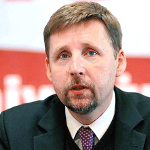 Marek Migalski, a member of the European Parliament, said he speech would be undiplomatic and brutal. He stressed the situation in Belarus remained difficult also due to the policy carried out by European officials.
Marek Migalski, a member of the European Parliament, said he speech would be undiplomatic and brutal. He stressed the situation in Belarus remained difficult also due to the policy carried out by European officials.
“I don't share Natallia Radzina's opinion on the possibility of protests in Belarus. The situation doesn't improve for a number of reasons. Firstly, it is a well-thought complicated game that Lukashenka plays. Most people regard him as a dumbhead, a funny lout, who doesn't understand what he says. But he is a dictator who is well aware of international affairs. The second reason is that Belarus has great significance for Russia. It puts much efforts for the things in Belarus not to change. The third reason is that the EU doesn't have a successful, stable and long-term policy. The EU has never had a policy towards Belarus that lasted more than 12 months. For example, sanctions were imposed, but later Makei was invited to Vilnius,” Marek Migalski said.
The MEP called on Europe to adhere to principles in relations with Belarus. “You cannot deal with the dictator, who treats his people as hostages,” he said.
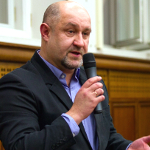 Zmitser Bandarenka, a coordinator of the civil campaign European Belarus, said why Europeans should be interested in democratic changes in neighbouring countries. He addressed Polish students as EU citizens.
Zmitser Bandarenka, a coordinator of the civil campaign European Belarus, said why Europeans should be interested in democratic changes in neighbouring countries. He addressed Polish students as EU citizens.
“Imagine how your neighbours look at the situation. The EU wanted a stability zone in the Union's borders. European bureaucrats from Brussels cooperated with dictator Gaddafi. They signed a agreement on neighbourhood, similar to that offered to Yanukovych. The same agreement was signed with Tunisian Ben Ali. Mubarak was the EU's best friend – many Poles and Russians go to Egypt on holidays. Yanukovych is a partner of the EU. Dictators Assads, father and son, were friends of France and Europe for many years. It turned out that European money was spent on stirring tension in the region. Look, there's either war or martial law in Libya, Tunisia, Egypt and Syria. Turkish PM didn't lose his power only by a miracle. We have protests in Ukraine today. Russia deploys medium-range missiles against the EU in Kaliningrad region.
Don't doubt, there will be a spark in Belarus, because people don't want to live under dictatorship. Does anyone think Lukashenka is popular? Everyone hates him.
Don't think someone in Brussels will make decisions instead of you. The EU border is an unstable zone today. They thought in 1938 in Munich stability was more important, Hitler should be supported because he was civilised. Don't trust bureaucrats. The European Union is in great danger due to their wrong policy. Open your eyes.
A conference to promote democracy in the EU's neighbours was recently held in Warsaw. It was attended by people from Syria, Egypt, Tunisia, Ukraine, Belarus and Turkey. There were people, who were involved in revolutions in their countries. They said: 'Don't work with dictators. Stop supporting them. You gave money to them, but they killed us. We rebelled against the dictators, whom you were feeding.'
Belarusians don't hope for European governments. Our problems are not their problems. Marek Migalski is the only one who cares about the Belarusian political prisoners. We hope on ordinary people – students, journalists, actors. A see a familiar face on skyscrapers in Warsaw. It's Kevin Spacey advertising a Polish bank. He is not a stranger for me. When I was in prison, he stood with my portrait demanding to release the Belarusian political prisoners. Famous Hollywood actor Jude Law raised a portrait of Natallia Radzina.
Many Poles go to the pro-EU protests in Ukraine today. It's right. Like Belarusians, Ukrainians and Syrians, you are players in the historic war for freedom. The slogan of Andrei Sannikov's campaign was 'History is being made today, we make history, we will win',” Zmitser Bandarenka said.
The conference provoked many questions from the audience. Belarusians asked about the plans and the strategy of the opposition and made their proposals. A student called on Belarusians living abroad to participate in political activities, hold solidarity pickets and spread information about events in Belarus.
Ukrainians compared the pro-EU protests and the Belarusian protests three years ago. They supposed Kyiv's protests could trigger a chain reaction in Belarus.
Students from Poland asked what the European Union and their country could do for changes in Ukraine and Belarus.
“Poland bears great responsibility, because it is considered to be a specialist in Belarus. It's Poland that can determine the EU's strategy on Belarus. I'd like to emphasise again that it is huge responsibility, because there's no strategy now. It should appear, because the events in Belarus, Russia and Ukraine require a more serious approach to the whole region. I agree with Marek Migalski. Little is being done today. But we should do something, because the situation is critical both for us and for you.
The European Union should be principled and insist on fulfillment of its conditions. The dictatorship can count on changes in relations only after the release and rehabilitation of the political prisoners. We should remember that the dictator has been ruling Belarus for almost 20 years. It's naïve to count on any reforms. Lukashenka chose the policy towards himself. He cannot hold negotiations. He has never kept his word. I think Lukashenka won't change. There won't be any political or economic reforms. We should be based on it rather than on naïve illusions,” Andrei Sannikov said.
